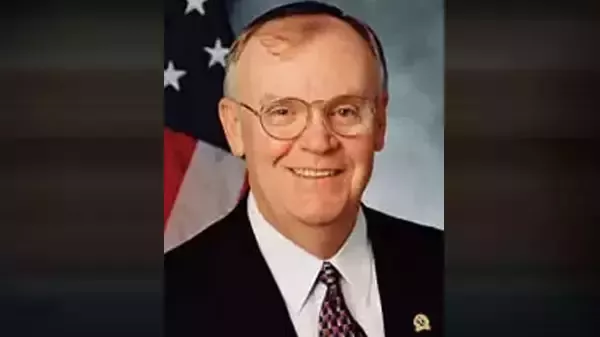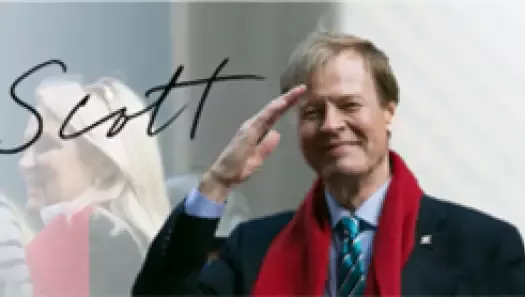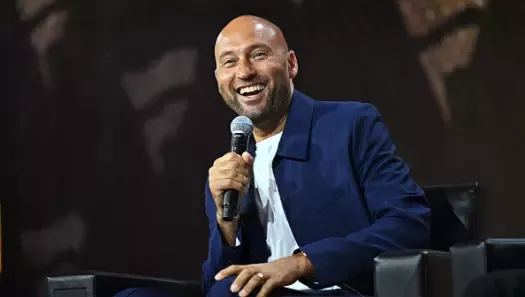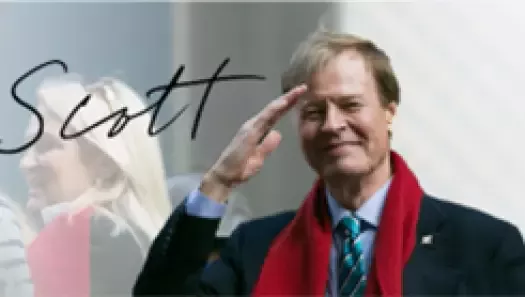HeroVet: Admiral James Loy

Whether it’s protecting thousands of miles of American coastline from maritime threats, or securing millions of square miles for domestic air travel, The Department of Homeland Security’s Deputy Head Admiral James Loy, the Coast Guard’s former Commandant is passionate about keeping our nation safe.
For Loy, as is the case for many of our nation’s defenders, the events of 9/11 dramatically changed his goals. In a life already filled with enormous accomplishments in military service, he delayed his retirement plans and committed to serve his country yet again.
"Did this day solidify my commitment to public service? On a personal level, it reinforced it. I had already been in uniform for over 40 years, but it adjusted my retirement intentions rather dramatically," he said during an online chat hosted by the White House Web site earlier this year. "For me, looking back on it, the day ushered in a new way of looking at security in our country, and made people I know in this department reaffirm, or came to public service for the first time based on their desire to find a way to contribute."
Admiral Loy retired from the Coast Guard as its Commandant on May 30, 2002. Transportation Secretary Norman Y. Mineta immediately appointed him to the newly created post of Deputy Under Secretary for Transportation Security and Chief Operating Officer of TSA. Since December 4, 2003, Admiral James Loy has served as Deputy Secretary of the Department of Homeland Security (DHS), under his boss, Secretary Tom Ridge.
In these critical years, Loy has championed a host of new homeland security programs, most notably guaranteeing that 100 percent of airline baggage would be electronically screened for explosive devices. This goal was a tall order, because of the demanding timetable brought about by 9/11, but more importantly because only five percent of the baggage was being screened on 9/10/2001.
Coast Guard Service
As Commandant from May 1998 to May 2002, he focused his leadership on restoring readiness and shaping the future of the U.S. Coast Guard. Although both themes involved many initiatives, the most visible expression of restoring readiness was rebuilding the Coast Guard’s workforce to authorized levels, improving retention and managing operational tempo. The primary element for shaping the future was his oversight and leadership in the Integrated Deepwater System acquisition project, which will modernize the ships, aircraft, and sensors that the Coast Guard uses to perform its many open ocean missions.
Prior to his service as Commandant, Admiral Loy served as the Coast Guard Chief of Staff from 1996 to 1998, during which time he redesigned the headquarters management structure and overhauled the Coast Guard planning and budgeting process to focus more sharply on performance and results. From 1994 to 1996, he was Commander of the Coast Guard’s Atlantic Area, leading U.S. forces during the mass Haitian and Cuban migrations of 1994, and leading Coast Guard forces participating in Operation Restore Democracy. His other flag assignments included Chief, Office of Personnel and Training, and Commander, Eighth Coast Guard District.
Combat: At Home and Abroad
A career seagoing officer, Admiral Loy has served tours aboard six Coast Guard cutters, including command of a patrol boat in combat during the Vietnam War and command of major cutters in both the Atlantic and Pacific Oceans. During Vietnam, his combat experience included commanding the U.S. Coast Guard Cutter Point Lomas, experience he brings with him to the challenges of today’s world.
"You find out your personal strengths. You find out your personal weakness, and you are not afraid because of the survivability kind of a quotient in that whole mix. You’re not afraid to share those both, in both directions such that the collective strength of the crew at large becomes a set of almost interchangeable parts, especially in a small patrol boat crew," he said in an interview with Coast Guard staff.
Its experience like that which he drew upon as he mobilized the Coast Guard into full readiness within minutes after 9/11. It also helped give him perspective as he toured the Ground Zero region soon after the attacks, which he called "almost a religious experience."
"Vietnam was long periods of almost boredom, interspersed with shear moments of panic, and 9/11, and thereafter for weeks on end in New York, was a constant unrelenting requirement for service across our spectrum. There was a humanitarian dimension to it. There was an efficient operational dimension to it. There was a non-nonsense military dimension to it, and all of those things were mixed into this incredible depth of focus that was, as I say, unrelenting, and that went on for days and then weeks.
"But there were many similarities (between Ground Zero and Vietnam) to the looks on people’s faces; in the aftermath of the specific incident and the aftermath of an incident that we might have had; a firefight or something in Vietnam.
When Ridge came aboard to head DHS, Loy personally welcomed him to the position and offered up his plan for designing homeland maritime systems. They also found out they went to rival high schools as kids, an "icebreaker" as Loy describes it. And he was highly impressed by his future boss.
Admiral James M. LoyAdmiral James M. Loy, Administrator, Transportation Security Administration at Washington Foreign Press Center Briefing on "The State of American Aviation."
"What came across immediately to me was the enormous capacity of the man (Ridge). You know a Vietnam Vet. He left law school to volunteer to go to Vietnam. Not a normal thing to be happening in those days," Loy said.
Achievements
Admiral Loy graduated from the U.S. Coast Guard Academy in 1964 and holds two master’s degrees, one from Wesleyan University and one from the University of Rhode Island. In 2003, he received the Honorary Degree in Science from the Webb Institute. He also attended the Industrial College of the Armed Forces and interned at the John F. Kennedy School of Government at Harvard University. His commendations are numerous, including the Department of Transportation Distinguished Service Medal; four Coast Guard Distinguished Service Medals; the Defense Superior Service Medal; the Bronze Star with Combat "V"; the Combat Action Ribbon; and other unit and campaign awards.
Admiral Loy was named SEATRADE Personality of 2000 in London, UK, has received the NAACP Meritorious Service Award for 2000, and was recognized by the Soldier’s, Sailor’s, Marine’s and Airmen’s Club with its Military Leadership Award for 2001. The American Society of Public Administration and the publication, Government Executive, recognized Admiral Loy with their Leadership Award for 2001.
The Reserve Officer Association inducted Admiral Loy into its Minute Man Hall of Fame. Most recently, he received the National Cargo Security Council National Leadership Award for 2002, and was honored with the Seaman’s Church Institute Silver Bell Award. He also received the Navy League prestigious Admiral Arleigh Burke Leadership Award for 2002.
Admiral Loy is married to the former Kay McGirk. They have two grown children, Kelly and Michael. The Loys have two grandchildren. Admiral Loy has been a member of Veterans Advantage since August 2003.
Image Credit: https://en.wikipedia.org/wiki/James_Loy#/media/File:James_M._Loy.jpg



